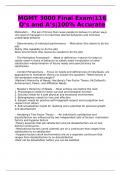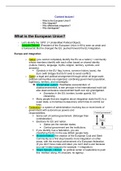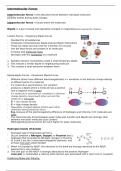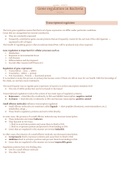MGMT 3000 Final Exam|116
Q’s and A’s|100% Accurate
Motivation - -The set of forces that cause people to behave in certain ways
-the goal of managers is to maximize desired behaviors and minimize
undesirable behavior
- Determinants of individual performance - -Motivation (the desire to do the
job)
Ability (the capability to do the job)
Work environment (the resources needed to do the job)
- The Motivation Framework - -Need or deficiency->search for ways to
satisfy need->choice of behavior to satisfy need->evaluation of need
satisfaction->determination of future needs and search/choice for
satisfaction
- Content Perspectives - -Focus on needs and deficiencies of individuals; are
approaches to motivation that try to answer the question, "What factors in
the workplace motivate people?"
-Maslow's Hierarchy of Needs, Herzberg's Two-Factor Theory, McClelland's
Achievement, Power, and Affiliation Needs
- Maslow's Hierarchy of Needs - -Must achieve one before the next:
1. Physiological needs for basic survival and biological function
2. Security needs for a safe physical and emotional environment
3. Belongingness needs for love and affection
4. Esteem needs for positive self-image/self-respect and recognition and
respect from others
5. Self-actualization needs for realizing one's potential for personal growth
and development
- Herzberg's Two-Factor Theory - --An individual's satisfaction and
dissatisfaction are influenced by two independent sets of factors- motivation
factors and hygiene factors
-Theory assumes that job satisfaction and job dissatisfaction are on two
distinct continuums:
--Motivational factors (work content) are on a continuum that ranges from
satisfaction to no satisfaction
--Hygiene factors (work environment) are on a separate continuum that
ranges from dissatisfaction to no dissatisfaction
-Must not be dissatisfied, before you can be satisfied
, - McClelland's Individual Human Needs - --The Need for Achievement: the
desire to accomplish a goal or task more effectively than in the past
-The Need for Affiliation: the desire for human companionship and
acceptance
-The Need for Power: the desire to be influential in a group and to be in
control of one's environment
- Process Perspectives of Motivation - -Focus on why people choose certain
behavioral options to satisfy their needs and how they evaluated their
satisfaction after they have attained their goals
-Expectancy theory
-Porter Lawler Extension of Expectancy theory
-Equity theory
-Goal Setting theory
- Expectancy Theory - --Motivation depends on how much we want
something and how likely we are to get it
-Behavior is determined by a combination of personal and environmental
forces
-people make decisions about their own behavior in organizations
-Different people have different types of needs, desires, and goals
-People choose among alternatives of behaviors in selecting one that leads
to a desired outcome
-Model of motivation suggests that motivation leads to effort when combined
with ability and environmental factors; effort results in performance;
performance, in turn, leads to various outcomes that have value (valence) to
employees
- Porter-Lawler Extension of Expectancy Thoery - --If performance in an
organization results in equitable and fair rewards, people will be more
satisfied
-High performance can lead to rewards and high satisfaction
-Extrinsic rewards are outcomes that are set and awarded by external parties
(such as pay and promotions)
-Intrinsic rewards are outcomes that are internal to the individual (such as
self-esteem and feelings of accomplishment)
- Equity Theory - --People are motivated to seek social equity in the rewards
they receive for performance
-Equity is an individual's belief that the treatment he or she receives should
be fair relative to the treatment received by others
-Individuals view the value of rewards (outcomes) and inputs of effort as
ratios and make subjective comparisons of themselves to other people
- Goal-Setting Theory - --Behavior is a result of conscious goals and
intentions
Q’s and A’s|100% Accurate
Motivation - -The set of forces that cause people to behave in certain ways
-the goal of managers is to maximize desired behaviors and minimize
undesirable behavior
- Determinants of individual performance - -Motivation (the desire to do the
job)
Ability (the capability to do the job)
Work environment (the resources needed to do the job)
- The Motivation Framework - -Need or deficiency->search for ways to
satisfy need->choice of behavior to satisfy need->evaluation of need
satisfaction->determination of future needs and search/choice for
satisfaction
- Content Perspectives - -Focus on needs and deficiencies of individuals; are
approaches to motivation that try to answer the question, "What factors in
the workplace motivate people?"
-Maslow's Hierarchy of Needs, Herzberg's Two-Factor Theory, McClelland's
Achievement, Power, and Affiliation Needs
- Maslow's Hierarchy of Needs - -Must achieve one before the next:
1. Physiological needs for basic survival and biological function
2. Security needs for a safe physical and emotional environment
3. Belongingness needs for love and affection
4. Esteem needs for positive self-image/self-respect and recognition and
respect from others
5. Self-actualization needs for realizing one's potential for personal growth
and development
- Herzberg's Two-Factor Theory - --An individual's satisfaction and
dissatisfaction are influenced by two independent sets of factors- motivation
factors and hygiene factors
-Theory assumes that job satisfaction and job dissatisfaction are on two
distinct continuums:
--Motivational factors (work content) are on a continuum that ranges from
satisfaction to no satisfaction
--Hygiene factors (work environment) are on a separate continuum that
ranges from dissatisfaction to no dissatisfaction
-Must not be dissatisfied, before you can be satisfied
, - McClelland's Individual Human Needs - --The Need for Achievement: the
desire to accomplish a goal or task more effectively than in the past
-The Need for Affiliation: the desire for human companionship and
acceptance
-The Need for Power: the desire to be influential in a group and to be in
control of one's environment
- Process Perspectives of Motivation - -Focus on why people choose certain
behavioral options to satisfy their needs and how they evaluated their
satisfaction after they have attained their goals
-Expectancy theory
-Porter Lawler Extension of Expectancy theory
-Equity theory
-Goal Setting theory
- Expectancy Theory - --Motivation depends on how much we want
something and how likely we are to get it
-Behavior is determined by a combination of personal and environmental
forces
-people make decisions about their own behavior in organizations
-Different people have different types of needs, desires, and goals
-People choose among alternatives of behaviors in selecting one that leads
to a desired outcome
-Model of motivation suggests that motivation leads to effort when combined
with ability and environmental factors; effort results in performance;
performance, in turn, leads to various outcomes that have value (valence) to
employees
- Porter-Lawler Extension of Expectancy Thoery - --If performance in an
organization results in equitable and fair rewards, people will be more
satisfied
-High performance can lead to rewards and high satisfaction
-Extrinsic rewards are outcomes that are set and awarded by external parties
(such as pay and promotions)
-Intrinsic rewards are outcomes that are internal to the individual (such as
self-esteem and feelings of accomplishment)
- Equity Theory - --People are motivated to seek social equity in the rewards
they receive for performance
-Equity is an individual's belief that the treatment he or she receives should
be fair relative to the treatment received by others
-Individuals view the value of rewards (outcomes) and inputs of effort as
ratios and make subjective comparisons of themselves to other people
- Goal-Setting Theory - --Behavior is a result of conscious goals and
intentions











